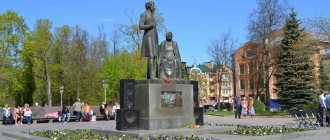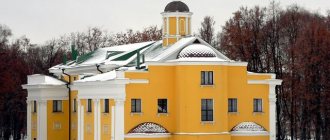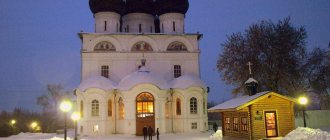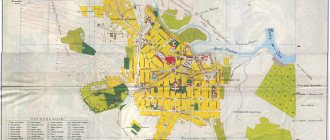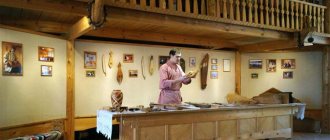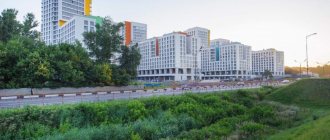Elektrostal (before 1928 - Zatishye) is a city (since 1938) of regional subordination in the Moscow region of Russia. Forms the Elektrostal urban district.
Population - 158,222 people. (2015). The area of the city is 49.51 km², the urban district is 51.40 km². The urban district of Elektrostal is located 52 kilometers (38 km from the Moscow Ring Road) east of Moscow. In the vicinity of Elektrostal, the Vokhonka River (a tributary of the Klyazma) originates, as well as the Vokhna’s tributaries - the Maryinka and Khodtsa. In the north, Elektrostal borders on the lands of the Noginsk mechanized forestry enterprise, and in the south and southeast - on the lands of the Pavlovo-Posad district. In the west and east, forests come close to the urban area.
The head of the Elektrostal city district is Andrei Aleksandrovich Sukhanov (elected in 2005, 2010 by residents, in 2015 by the City Council of Deputies). Before him, the city was led by Nikolai Pavlovich Zelenin (from 1990 to 2003) and Nikolai Petrovich Vasiliev (from 2003 to 2004).
General information and history of the city
Elektrostal is a modern industrial city located 42 km east of Moscow. It borders on the lands of the Pavlovo-Posad district from the south and the Noginsk mechanical forestry enterprise from the north. The western and eastern surroundings are surrounded by forests. This is where the river begins. Vokhna.
Panorama of the city. Photo by garshanin (garshanin.livejournal.com)
It is officially believed that Elektrostal began its existence with the construction of the first plants on its territory - electrometallurgical and equipment in 1916.
Old Elektrostal
However, it is known for certain that on the territory of the modern city even before 1916 there were small villages, of which there are millions in Russia. However, it was with the construction of factories that the future city began its development. Already in 1925, a railway was built connecting the village with Moscow, and in 1938 the settlement was named the city of Elektrostal. At that time the population already numbered 43,000 people.
During the Second World War, the city's factories and enterprises produced ammunition for the front, and in 1954, most of them were repurposed for the production and production of fuel for nuclear power plants.
In 2013, Elektrostal received the status of a city of military and labor glory.
At the entrance to the city
Attractions
There are many numerous monuments in the city that tell the history of this amazing place: a monument to Nikolai Vtorov - the founder of the famous House of Culture, a monument to Tevosyan - the chief engineer, monuments to M. Gorky and K. Marx, the sculpture "Steelmaker", a monument to Korneev - Hero of the Soviet Union , as well as a memorial and monument to soldiers who died in Afghanistan and the North Caucasus.
Climatic conditions and ecology of Elektrostal
The climate of Elektrostal is moderate continental. Mild winters alternate with warm summers characterized by high air humidity. The coldest month is January (on average -14 – 20°C), and the warmest month is July (+21 – 23°C).
Over 100 years of observations, an absolute historical minimum was recorded - 45°C, as well as a maximum of +37°C. Out of 100% sunlight, Elektrostal receives only 34%, the rest is absorbed by clouds and smog.
A large number of enterprises and factories, or rather their activities, have a detrimental effect on the environmental situation as a whole.
Plant in Elektrostal. Photo by truebetscoy (https://www.panoramio.com/user/682621)
Environmental issues in the city are dealt with by a special department that maintains statistics on emissions and environmental pollution and carries out targeted programs aimed at improving the environment. For example, cleanup days, liquidation of unauthorized dumps, inspections, etc. But all this is just a drop in the ocean of industrial waste.
Polluting enterprises themselves are also trying to combat the poor environment, minimizing the damage caused by reducing emissions and waste.
Although statistics from environmentalists indicate the opposite. For example, the amount of emissions into the atmosphere in 2013 increased by 1.5 times. True, solid pollutants actually began to be emitted less.
In the courtyards of some houses
As for treatment facilities, at the moment only the construction plan is being selected. In the meantime, the majority of all wastewater goes to neighboring Pavlovsky Posad through a 36 km long sewer.
Recently, in different areas of the city, complaints from citizens about a strange smell have become more frequent. By the way, in the city the norm for the content of benzopyrene and nitrogen dioxide in the air is tens of times higher. And over the eastern side of the city, where the highest concentration of factories is, there is heavy smog every morning.
In April 2013, the entire Elektrostal was shaken by a powerful explosion. At the largest EZTM plant, an emergency situation occurred, as a result of which radioactive Cesium-137 was released into the atmosphere. It is noteworthy that the media did not cover this event in any way, simply hushing it up.
Main alley
One of the main attractions of Elektrostal, a photo of which almost every resident or visitor has, is the Main Alley. Passers-by love to stroll along its shady paths, and townspeople relax by the fountain after a hard shift at the factory. The alley is decorated with flower beds. In 2006, a flower festival was held here for the first time, which became traditional. Every city enterprise and private individuals give residents a real composition of fresh flowers, which delights with bright colors all summer long. There is a riot of colors, aromas and flights of imagination here. Walking through the park, you can see Snow White with a basket, a bright well, a multi-tiered cake made of fresh flowers, hearts of lovers or a fairy-tale tower. It’s almost impossible not to take a photo against the backdrop of these compositions.
Population of Elektrostal
At the beginning of 2014, 157,409 people lived in Elektrostal. Since 2009, the population has increased by more than 10,000 people. But not due to natural growth, but thanks to visitors for permanent residence from other cities.
Day of the city
It is not difficult to guess that the number of permanent working-age population is growing from year to year and amounts to about 65-70% of the total population. The average age of able-bodied residents is 41 years.
If we talk about gender ratio, then Elektrostal is no different from most Russian cities. As throughout the country, there are more women here than men. The percentage is approximately 55% to 45%. Moreover, the number of the latter is gradually decreasing. This is believed to be due to the low birth rate of boys, as well as work in uranium production, which employs predominantly men.
If you turn to statistics and look at the birth rate, then per 1000 people it is 9, and the death rate is 16.4.
The general demographic situation in Elektrostal leaves much to be desired. In addition, the mortality rate of newborn babies has increased in recent years. Today, targeted programs aimed at improving these indicators and the general situation are priority areas of the city administration.
Children's Day
If we talk about the morals of the townspeople themselves, then we immediately remember Menshov’s famous film “Moscow Doesn’t Believe in Tears.” So Elektrostal also doesn’t believe in tears, and that probably says it all. Sad, constantly in a hurry people who can find hundreds of excuses, just not to waste their time telling how to get to the nearest hotel or cafe. Of course, not all city residents do this, but precedents happen often.
If we talk about education, then we can say with confidence that residents of Elektrostal are far from stupid. But again, the bulk is the proletariat.
Historical and Art Museum
Until 1999, among the attractions of Elektrostal in the Moscow region there was no central museum. The exhibitions were exhibited in schools, the cultural center, and factory museums. The city was closed, so there was not a large influx of tourists and visitors. The appearance of the historical and art museum made it possible for residents and guests of the city to learn a lot of useful information about their native land, the formation of the production process, and the difficult years of the war. The exhibition includes paintings by local artists, historical artifacts, household items, documents, books and much more. The collection is updated regularly. It also hosts traveling exhibitions, which are always popular among city residents.
City districts and real estate in Elektrostal
In terms of zoning, Elektrostal is a very simple city, which is divided into 5 sectors: East, West, South, North and Center. Each district corresponds to a street with the same name, so by opening a city map, you can easily find your way around which district is which. In terms of infrastructure, it is impossible to single out any of the districts, since they are all quite well developed and have their own pros and cons.
Stroll the city streets using Google Panoramas
Vostochka
The eastern side began to be built up first; it is separated from the city by railway, which is a big disadvantage. Getting to or leaving Vostochka during rush hour is very problematic. The situation is complicated by the small number of railway crossings, there are only 2 of them in the entire city, and this takes into account the fact that electric trains run every half hour and the crossings are closed.
Western region. Photo by garshanin (garshanin.livejournal.com)
But the most important disadvantage of the Eastern District is its close proximity to most of the city’s factories, and especially to Mashinostroitelny. Now try to imagine the morning in this area - strong smog and a strange smell.
Otherwise, Vostochka is a nice, cozy area with high-rise buildings and wooden private houses. The area borders on a forest belt, there is a pond "Yubileiny", equipped with the sports complex "Crystal", a stadium, a ski base, and a tennis center.
Jubilee Pond. Photo by estu_bona (https://estu-bona.livejournal.com)
On the East Side there is a large hospital campus where many medical services are provided. Also, there are a large number of shopping centers, entertainment centers, etc. The area is rapidly and actively developing.
The cost of a 1-room apartment in this area of the city is approximately 2,550,000 rubles.
Vostochka, private houses. Photo by Boris Trikhleb
Western region
The western part of the city is heterogeneous in development. Multi-storey high-rise buildings, Khrushchev-era buildings and 5-storey panel houses with improved layouts coexist well here.
Western region. Photo by garshanin (garshanin.livejournal.com)
As in other regions, the infrastructure of Western is very well developed. The area is considered the cleanest from an environmental point of view due to its distance from factories, borders a forest belt, and has lakes and parks. Many schools, kindergartens, playgrounds. Large shopping centers, branded stores and supermarkets, and a clinic are within walking distance. Well-developed transport links with other areas. 10-15 minutes from the railway station. Fryazevo (eastern direction to Moscow), which is very convenient for city residents who work in the capital.
West
All these factors contribute to the high cost of housing in this area. The price of a 1-room apartment here is approximately 3,000,000 rubles.
Southern region or “four”
The southern microdistrict of the city is located in close proximity to the center. The main buildings are multi-storey residential buildings, mostly gray in color.
Southern region
In the courtyards there are many children's playgrounds, specialized areas for various sports (football fields, basketball courts, ping-pong tables, etc.).
Southern
In this area there are railway and bus stations, the Crystal Sports Center, a large number of shopping centers and bases, universities, a city park and a specialized area for extreme sports.
Ice Sports Palace. Photo by Maarten Dirkse
Northern region
The northern side of the city is a nice little residential area, consisting mainly of high-rise buildings.
Northern
Recently, active development of 6 hectares of land has been underway for a new large microdistrict “Northern Quarter”.
Northern region
The northern side is located in close proximity to the city of Noginsk. Actually, they are separated by 5 km of forest belt. In the area there is a clothing market, a hospital, the largest shopping center "Elgrad" and chain stores, fitness clubs, and a cinema. Many schools and kindergartens. Intracity and intercity transport supplies are sufficiently well provided. The cost of a 1-room apartment in this area of the city is approximately 2,300,000 rubles.
Center
Construction of the central part of the city began only closer to the 50s; before that, there were vacant lots and potato plantations here. Judging by the time frame, it is not difficult to guess that the bulk of the buildings in the center are occupied by so-called Stalinist buildings, decorated with all kinds of stucco molding and other attributes of Stalinism.
City center
However, they get along well with 4-5-story Khrushchev-era buildings and 9-story panel buildings. There are a lot of beautiful squares and green spaces in the center.
Center. Photo by estu_bona (https://estu-bona.livejournal.com)
Very good transport links with other areas of the city. There are many shops, schools and kindergartens here. But the playgrounds in the courtyards of houses are mostly quite old. The cost of a 1-room apartment in this area of the city ranges from 2,000,000 rubles and above.
Photo by estu_bona (https://estu-bona.livejournal.com)
Temple of the Righteous John of Kronstadt
This temple - a landmark of Elektrostal - is a single-domed centric church, which is made in the style of Byzantine times. It was erected in the 20th century, in close proximity to St. Andrew's Church. The temple was designed by T.V. Trubnikov and V.A. Drozdov, according to whose designs the iconostasis and interior were designed exactly.
The church plays the role of a baptismal temple and belongs to the Moscow diocese. The main shrines of the church are the oldest and most valuable icons of Nikandor of Gorodnoezersk and the Great Martyr Panteleimon. In addition, particles of the relics of saints are kept here. Services in the temple are held only during religious holidays.
Infrastructure condition
The housing and communal services sector in Elektrostal is developing quite dynamically. There are many private and municipal enterprises in the city, the oldest of which is the municipal unitary enterprise "PTP GH", whose jurisdiction includes "Teploset" and "Vodokanal". There are practically no disruptions to the supply of electricity or water. But as for the complaints against housing offices, there are plenty of them. Many houses and nearby courtyards are poorly cleaned, and the entrances are often covered with graffiti by local hooligans. If this can be understood, then the constant litter on playgrounds is discouraging. It seems that the wipers simply forget about them.
Recently, a trial project was launched in the city - “BARS.ZHKH”. This is a unified housing and communal services database for the city, where anyone can get the information they are interested in about the services and tariffs of their own or someone else’s management company, the amount of utility bills, find out what it consists of, etc. Residents of Elektrostal liked this innovation. If we talk about the amount in the monthly payment for an apartment, then on average it is 3,000 rubles.
As for road battles, there are few problems with this in the city. The asphalt here is relatively good. Recently, planned repairs of asphalt pavement in the courtyards of houses were completed. True, most residents had questions about the competence of the contractors and the quality of the pavement being laid.
Due to the high level of industrial development, the city has many transport routes and interchanges. You can get to Elektrostal by car, bus or train. And transport provision within the city is also developed at a fairly good level. There are more than 100 buses and 50 minibuses in the city, and many taxi organizations. Elektrostal ranks 9th in Russia in terms of the number of cars per 1000 inhabitants.
In general, the social infrastructure of Elektrostal is very well developed. There are 42 preschool institutions in the city. These include kindergartens, child development centers, and kindergartens for children with developmental delays. Additional education is provided by music, sports and art schools. General secondary education is provided by 13 schools, 4 gymnasiums, 3 lyceums and an evening school. The doors of 7 universities, numerous colleges and technical schools of various fields are open to graduates.
MISiS branch
The level of healthcare and medical services in the city is quite high. This area is constantly developing, the hospital campus is being actively reconstructed, and new equipment is being purchased. Elektrostal ranks 71st in Russia in terms of this indicator.
City administration
Recreational opportunities
Since migration flows to the city attract a large number of labor, the population of Elektrostal is constant. At the same time, able-bodied citizens between the ages of thirty and forty dominate. All conditions for relaxation have been created for them. There are cinemas “Sovremennik”, “Gallery Kino”, “Domino”, “Solaris”.
There is a local history museum. The city authorities are restoring the surviving churches and building new churches. The city is growing and developing. The Avangard paintball court and the Metallurg indoor swimming pool, tennis courts and bicycle paths were put into operation.
Enterprises and work in the city
Elektrostal has the status of a city of federal significance and is not subsidized. The salary here is at the average level in Moscow, while the cost of living is cheaper than in the capital. As a percentage:
- 27% of the population have a salary of up to 19,000 rubles.
- 40% earn up to 45,000 rubles.
- 18% have earnings above 45,000 rubles.
The average salary is just over 30,000 rubles, while the average cost of renting a one-room apartment does not exceed 15,000 rubles.
In terms of employment, Elektrostal has been in the TOP for quite a long time and holds 5th position in the Russian Federation. Almost 70% of the residents work here. This is no wonder, because in the city there are 3 large city-forming enterprises and hundreds of small companies producing furniture, food, clothing, building materials, etc.
Industrial park
Elektrostal is Russia's largest center of metallurgy, heavy engineering, nuclear fuel production and the chemical industry.
Of course, the most important city-forming enterprises are:
JSC "Machine-Building Plant", which employs 4,300 people.
Mechanical engineering, where 6,200 people work.
Metallurgical plant. Photo by estu_bona (https://estu-bona.livejournal.com)
JSC Elektrostal Heavy Engineering Plant, which employs 2,200 people.
EZTM. Photo by pescinka (https://www.panoramio.com/user/597990)
The food industry is also developing well. The city has a large dairy plant, fish farms, tea companies and a bakery.
There is a lot of work in the city for people of different specialties, experience and education. Huge shopping centers employ more than 3,000 people; in addition, there are hundreds of shops, pharmacies, hairdressers, travel agencies, banks, etc. Well, if someone doesn’t like this kind of work, Moscow is nearby with an even greater variety of open vacancies.
Train Station
The Elektrostal railway station is a station in the Gorky direction of the Moscow Railway, which is located on the dead-end branch of Fryazevo-Zakharovo. Included in the Moscow-Kursk center for organizing the work of railway stations DTS-1.
The railway station is located at st. Zheleznodorozhnaya, 3. The distance from the city center to the station is 1 km. Operating hours: 24 hours a day. Trains pass through the railway station in the following directions: Moscow, Zakharovo, Noginsk.
Crime report
In terms of crime, Elektrostal ranks 103rd in Russia, its level is below average. Every year about 2,000 crimes of varying nature and severity are committed here.
City Internal Affairs Directorate
In recent years, the city has seen a tendency for crimes to be committed during the daytime and in public places, usually burglaries and thefts.
Cases of fraud against the elderly have become more frequent. Criminals ingratiate themselves with pensioners and defraud them of money under various pretexts.
The crime situation by region is as follows. In the northern area of the city, burglaries are prevalent. Burglars are attracted to home valuables in new high-rise buildings in an elite area where fairly wealthy people live. In the Central microdistrict, where old houses predominate and somewhat different people live, criminal activity manifests itself in showdowns caused by the “high degree”.
The positive thing is that over the past 5-7 years, teenage crime has begun to actively decline.
One of the most notorious crimes that resonated with city residents was the brutal murder of the honored circus artist, clown and trainer E. Maranogli.
Clown trainer E. Maranogli
According to the investigation, a 25-year-old native of Penza and her 22-year-old husband, living in Elektrostal, came to Maranogli and demanded a large sum of money. When he refused, the young man stabbed the trainer 16 times and cut his throat. The suspects have been charged.
Automobile highways
The following roads pass through Elektrostal:
- M7 "Volga" is a federal highway with a total length of 151 km. It is part of two European routes: E22 and E017. The route passes through the territory of the following regions of Russia: Moscow region, Tatarstan, Chuvashia, Vladimir region, Bashkortostan, Nizhny Novgorod region. The road surface of the M-7 route is asphalt.
- A107 “Moscow Small Ring” is a highway that has the status of an object of federal significance. Also known as “Small concrete” and “First concrete”. The total length of the route is 333 km. The route passes through the territory of the Moscow region. The road surface is asphalt concrete.
- E22 is a European route that passes through the Netherlands, Great Britain, Latvia, Russia, Sweden, and Germany. The total length of the highway is 5,320 km.
Social protection
The following categories of residents of Elektrostal receive financial assistance, which is issued by employees of the city social protection authority:
- large families;
- persons with disabilities;
- orphans;
- the poor;
- pensioners, lonely old people;
- students;
- widowers;
- elderly people over 85 years of age.
Those arriving from the former Soviet republics are paid a lifting allowance as part of the resettlement program for compatriots. They are provided with assistance in finding housing, finding employment, and enrolling their children in kindergartens and schools. The priority of the migration service is ethnic Russians. Due to the uncontrolled flow of visitors from Moscow, ethnographers note an increase in the proportion of representatives of the Azerbaijani, Armenian, Gypsy, and Ukrainian diasporas.
In most cases, they live separately and work in the capital. They also conduct active business activities in the field of trade and services to the population of Elektrostal. They contain vegetable, cereal and grocery stores, small stores of inexpensive clothing and toys. They sell building materials and repair cars. They are engaged in passenger and freight transportation.
Forecasts
According to statistics, the region has favorable development prospects. Natural population decline is a thing of the past. Today, the number of children born is rapidly increasing, and infant mortality is gradually decreasing.
Due to the large number of labor migrants, the age coefficient is gradually decreasing. There are fewer pensioners than able-bodied people. The weight of the social burden is reduced, which helps improve the quality of life in the region and indirectly affects the increase in the birth rate.
The number of families raising two or more children will soon reach the levels that were recorded in the eighties of the 20th century. The number of women giving birth over the age of thirty-five is increasing. This is due to the late registration of marriage, as well as the development of medical technologies in Elektrostal. The number of maternal deaths during childbirth has almost halved.


